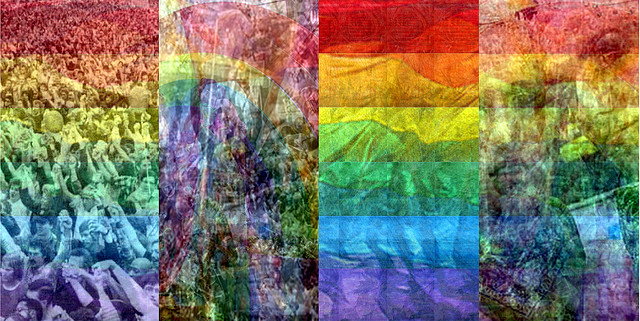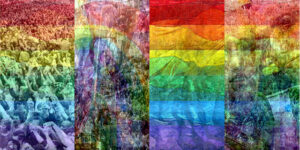6 Things On This Gay-Not-Gay Husband’s Mind Following ‘My Husband’s Not Gay’ and the Controversy Surrounding It
Written By “Brother GayNotGay”
Imagine you are a fairly typical Mormon husband and father, working a fairly typical Mormon job, enjoying your fairly typical Mormon life, all while dealing with your fairly typical Mormon doubts. One day, you discover that the most buffoonish cable TV network around will be featuring a show that will surely hyper-magnify the very foundation on which your fairly typical Mormon life is built– doubts and all.
You worry that what will air will be a gross and cartoonish oversimplification of such a nuanced and complex issue, yet, on another level, you are glad that the unique way you live life might be given some sort of validation under the public eye.
As each day passes before the airing of this show, a different person with a voice louder and more influential than that of the day before, has peered through the microscope into the foundation of your fairly typical Mormon marriage to offer their scathing opinions, that mostly lack any shred of sincere understanding or empathy. They speak as though the tiniest of cracks in this foundation were a vast chasm with no hope of repair.
With each article that is written, comment that is made, and tweet that is posted, you are forced to not only (unnecessarily) reassess your fairly typical Mormon insecurities, but also mentally and emotionally defend your fairly typical Mormon marriage and every single life-defining decision that have brought you to where you are today.
This pretty accurately summarizes my very draining day-to-day experience with TLC’s “My Husband’s Not Gay” (MHNG) and most importantly its backlash, over the past two weeks. It has spurred a cyclone of mixed of emotions in me that include, but are not limited to:
- How do perfect strangers really feel about an issue that is so interconnected with the foundation of my life?
- For my family and friends who know about my situation, will they look at the couples on this show and think ‘Oh, that’s how Brother and Sister GayNotGay’s marriage MUST be too.”
- How will my very smart, very strong wife, whom I’ve been open with about these issues since before we started dating, react when the world is telling her she is stupid, and incapable?
- How will the differing viewpoints and perspectives that I have with the people on the show be presented?
- How will this show reflect on the broader community of Latter-day Saints who choose not to pursue same-sex relationships and keep their covenants instead?
- How will these differing opinions that are practically being shouted at me through the computer screen impact how I feel about my own life and marriage?
So after having gone through this experience, and watching the show, I’ve managed to boil my thoughts into six major points.
- Yes, I have some things in common with the MHNG characters.
- Like them, I am LDS.
- Like them, despite feeling a level of attraction toward men, I have married a woman.
- Like them, I feel physical, emotional, and spiritual attraction toward my spouse.
- Like them, am part of an organization, North Star, which seeks to provide community and support to Latter-day Saints affected by the issues of homosexuality and gender identity and desiring to keep the sacred covenants they have made.
- Like them, my decision to to pursue a life within the Gospel and marriage was not prompted by self-hate, shame, self-loathing, or pressure from anyone. or anything.
And this is where the list of similarities ends, although I will admit that I probably share more in common with the real people who portray these characters, over the larger-than-life caricatures I saw on TV.
- The characters on MHNG are just that, characters.
I know most of the individuals portrayed on MHNG on varying personal levels and can tell you without hesitation that what I saw wasn’t at all a fair representation of who they really are and how they live their lives, much less the hundreds of men and women I have met throughout my involvement with North Star.
It is important to point out that the characters and scenes puppeted around on my TV was a poor, incomplete reflection of what our actual lives really look like. What I saw felt forced, awkward, staged, and at times, scripted. One should absolutely not judge the entire faithful LDS-homesexual experience on what was presented on a TLC “reality” special. If you were to meet me, or any of us, in real life you would think, “Hey, he’s a fairly typical Mormon guy.”
- Mostly, however, our experiences are entirely different.
- Unlike them, I don’t check out men with my wife. I don’t think my wife even knows what kind of men I find attractive and it’s not because I’m shameful about my feelings, it’s because I just don’t feel it’s at all relevant to my marriage.
- Unlike them, I don’t have (and have never even heard of) a “danger scale.” Seriously. After ten years of being involved in gay-Mormon circles, I have never heard of this “danger scale.” In my opinion, it’s a little silly.
- Unlike them, I don’t have sleepovers with other men. Really?
- Unlike them, I don’t play basketball. I’m not a big fan of sports, much less playing them. But something tells me most gay/SSA men don’t get together to play basketball.
- Unlike them, all of my conversations do not revolve around the issue of homosexuality. But again, this is a “reality” show that centers around this very topic, so of course every conversation will center around what the show is actually about.
- Unlike them, I don’t wear do-rags, or wife beaters. When I saw this I shook my head.
- Unlike them, a very strong majority of my day-to-day interactions are not with other gay/SSA men. Admittedly however, I don’t live in Mormon Central like these fellows, but I still wouldn’t choose to have exclusively non-straight friends.
- Unlike them, I don’t attend weekend retreats designed to examine the “wounds” around my orientation. Retreats that are shrouded in secrecy and controversy.
- Unlike them, I don’t get butt hurt if the term SSA isn’t used. In truth, they aren’t even that bothered by the term gay, but I’m sure the producers felt like it was a good and divisive sticking point. They were right.
- Using gay vs. using SSA is so much more complex.
Nothing has made people chuckle or roll their eyes more than the title itself, and that includes most of gay/SSA Mormons. But, like I mentioned, this was more of an invention of producers to stir the pot, than a reflection of the cast’s strongheld viewpoints, whom had no input on the creation of this title.
The word “gay” even means different things to different people within the LDS gay/SSA community. For some, gay simply means having physical, sexual, and deeply emotional attractions to people of the same-sex, while for others it connotes the accompanying choice to act on those attractions and pursue same-sex relationships. That is why the term SSA seems to fit more comfortably– because it adequately describes their situation while also explaining that their choice to stay true to their faith. Can you come up with an easy term that explains:
- I’m attracted to the same-sex
- Yet, I don’t want to act on it
- While desiring to remain a faithful Mormon
- Oh, and I don’t necessarily identify with the LGBT movement or community.
For this topic, I feel like it’s important to take people at where they’re at and what they’re comfortable with. If someone wishes to self-identify as gay or SSA, I ought to respect that person and refer to them in whatever manner they choose always seeking to understand the why behind it.
- North Star isn’t the crazy homophobic organization media has made it out to be.
Truth be told, all seven stars of MHNG are indeed active parts of the North Star community, with two serving on its current Board of Directors, and one being a former president, so critics are quick to connect North Star to these individuals, and the way they live their lives. But then, in the same breath that North Star is mentioned, so are its supposed horrors.
Here are some falsehoods and exaggerations about North Star:
- It is a radical “ex-gay” movement
- It is anti-Gay
- It preaches “praying the gay away”
- It pushes reparative therapy and encourages members to change their orientation
- It pressures individuals to enter into heterosexual marriages
- It seeks to shame individuals for their attractions
Here is the truth about what North Star actually is:
- It is an organization that fully supports the doctrines of the LDS Church
- It seeks to help support individuals who have made their own decision to stay true to their covenants despite their attractions or orientation
- It is a grassroots, community-driven organization
- It provides resources and a loving community to those who seek it
- It has been instrumental in helping bless the lives of thousands,
- Moving forward, the most important lesson to learn from all of this is the importance empathy and understanding.
Most of the backlash received from this special I was pretty much expecting, especially from the more vociferous opinions from the LGBT community. But, I must admit, I have been shocked and disappointed by the lack of understanding and empathy shown by my fellow fairly common Mormons. I can’t tell if their opinions are in direct response to how these awkward characters have been portrayed for TV, or if they truly disagree with their choice to remain true to their faith, their desire to marry, and all that it entails. But what is evident is a serious lack of respect for the way others choose to live their lives despite the fact that their shared faith is one of the leading reasons.
I will admit, the actual show itself did little to help expand understanding or empathy, but I feel like the space it has carved out in our current cultural climate to be vastly more important and impactful than a cheesy upbeat soundtrack, and a few lame fall-flat jokes.
Elder Lynn A. Mickelson, of the Seventy, defined the often misunderstood term of empathy, “Empathy is the gift to feel what others feel and to understand what others are experiencing… It stimulates and enhances our capacity to serve. Empathy is not sympathy, but understanding and caring. [It] leads to respect and opens the door to teaching and learning.”
My hope for my fellow fairly common Mormons moving forward is to make a conscious effort to move past the loud voices screaming from the sidelines, move past the silly show titles, and find a quiet place to listen, truly listen, to the stories and experiences of all or any couples in this situation. Who are they? Why have they chosen this? Learn from them. Have empathy for them.
A statement from the Church’s own Mormons and Gays website says it beautifully, “The human family comes in every shade of difference. The greatest and smallest of us possess as many unique talents as we do weaknesses. Yet it is so easy to miss the common ground we all walk on. If we want to understand one another we have to see ourselves in one another. Open the book of each individual life and you will find a familiar story.”
Featured image by QThomas Bower



If anyone says that they are not Gay and they rate above 3 on the Kinsey scale they are not being totally honest.
Richie, thank you for your thoughtful response. May I ask how open you are with the Mormons in your life about your situation, outside North Star – family, friends, fellow RMs, if served a mission, ward members, Bishop, SP, etc.? How have people responded? Thank you and all the best, Serena
This is a guest blog so not written by me. I will pass the question along to the author of the post.
I am a 71 year old woman who has never been attracted to people of the same sex. However, I see the ‘acting/not acting on’ urges for the gay community the same as as for the straight community. How many of us have had (strong) feelings toward another human being while married? Many people choose to act on those feelings by “cheating”, to one degree or another. Those of us who have chosen to remain faithful to our marriage vows and partner are no different from a person who is attracted to a person of the same sex. The feelings and urges are the same for all of us. It’s how we choose to deal with those urges and feelings that matter to God.
This was such an enlightening article and it definitely answered many questions I’ve had about SSA members of the church. Thank you, so much, for taking the time to help us understand. Excellently written.
Thanks for this article. Very well said. I’ve enjoyed the information on the NorthStar website. I’ve also found a lot of helpful information at samesexattraction.org.
Nice try spinning for Northstar but no one outside your LDS bubble is convinced. You are heavily invested in a homophobic and heterosexist theology that you will most likely regret someday, like thousands of gay men before you. You will have to accept responsibility for the damage you have done to your wife and kids and all the gay kids who kill themselves rather than fake a sham marriage.